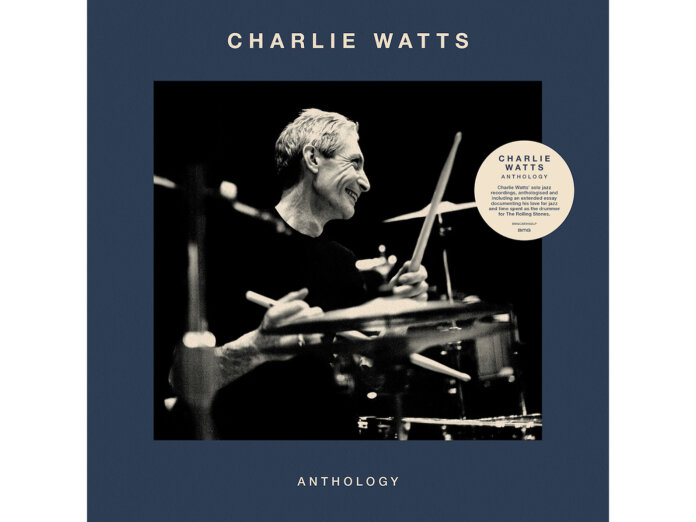Charlie Watts wasn’t the first Stone to go solo – that honour goes to Bill Wyman in 1975. But, two years later, in an event that seems to have gone largely unrecorded in Stones folklore, Watts found himself in front of 200 punters at the Swindon Arts Centre, playing blues and jazz standards with a band featuring the local boogie-woogie pianist and singer Bob Hall. “This is a one-off thing,” Watts told the Swindon Advertiser at the time. “I have never really played with this sort of band before, although I used to play with bluesmen like Alexis Korner in the early days.”
It was, in hindsight, something of a clue for how Watts’ solo career would develop. Previously unreleased, three tracks from that Swindon session form the climax of this mammoth overview of Watts’ extracurricular work. He’s joined by old friends: Ian Stewart, the hidden sixth Stone, is on piano, while the bassist Dave Green, a childhood friend and neighbour from the Wembley prefabs where Watts was raised, is on bass (as he is on most of Watts’ jazz releases over the next four decades). It’s a fascinating session – a waystation between the rock’n’roll of his day job and the big-band swing that Watts loved. There’s a rumbling Louis Jordan-style version of John Lee Hooker’s “Rockhouse Boogie”, with a three-piece horn section; a rather daft 12-bar blues sung by Bob Hall; and an impromptu piece of jump-blues written by the trumpeter Colin Smith called “Swindon Swing” (one that Watts also recorded on a tour of Europe with a band called Rocket 88, featuring a few members of this Swindon lineup).
A commitment to the Stones’ touring and recording schedule prevented Watts from making more music like this. But in 1985, with Mick Jagger promoting his debut solo album She’s The Boss, Watts took advantage of a furlough to form the Charlie Watts Orchestra. He enlisted one of his heroes, the Charlie Parker-inspired British alto saxophonist Peter King, to assemble a 30-piece big band that blended well-established London beboppers (the likes of Stan Tracey, Bobby Wellins and Alan Skidmore) with more experimental veterans (Evan Parker, Harry Beckett, Dave Defries) and the cream of young London players (Courtney Pine, Annie Whitehead, Ted Emmett, Steve Sidwell, Gail Thompson).
The extracts from their 1986 debut album Live At Fulham Town Hall are wonderfully chaotic and rambunctious recordings. The two tracks that open the album, the Benny Goodman band favourites “Stompin’ At The Savoy” and “Flying Home”, start as hard-driving big-band swingers, edge into jump-jive territory, and eventually morph into Mingus-style orchestral freakouts. Watts isn’t the only drummer here – he’s flanked by the free-jazzer John Stevens and the old-school bebop veteran Bill Eyden – but the drums are very low in the mix: Watts is happy to just stoke the fire.
In 1960, while working as a graphic designer, Watts created a scrappy self-made picture book called Ode To A High Flying Bird, with his cartoons and handwritten text telling the story of Charlie Parker (“a tribute, from one Charlie to another”). London’s Beat Publications cashed in by publishing it in 1965, but it wasn’t until 1991 that Watts turned this offering into a musical project. From One Charlie is represented here by five tracks, all recorded with a tight Parker-style quintet: Watts, Green and King are joined by pianist Brian Lemon and the prodigious teenage trumpeter Gerard Presencer. There are two Parker covers – a sinuous blues called “Relaxing At Camarillo” (the most cheerful song about being confined to a mental institution you’ll ever hear) and “Bluebird” (another blues, with a dazzling Presencer playing the Miles Davis role). But it’s Peter King who dominates the show, writing all the other tracks on the album in the Bird style, including “Practising, Practising, Just Great” (which starts with a three-minute alto solo), the languid blues “Going, Going, Going, Gone”, and the uptempo “Blackbird, White Chicks”.
Also recorded in 1991 – with Watts taking advantage of another Stones furlough – is a live set from Ronnie Scott’s short-lived Birmingham franchise. A Tribute To Charlie Parker With Strings sees the quintet joined by a string sextet (who play some sensational, angular harmonies) and New Yorker Bernard Fowler. Fowler is best known as a backing singer for the Stones as well as artists as diverse as Herbie Hancock, Gil Scott Heron, Sly & Robbie and Ryuichi Sakamoto, but he makes a remarkable, soulful jazz frontman, his androgynous tone stealing the show on versions of “Lover Man” and “If I Should Lose You”.
Watts’ most experimental album by far is his 2000 collaboration with Jim Keltner, an electro-acoustic project where all nine tracks were dedicated to the pair’s drumming heroes. It’s represented by two tracks here – the heavily synthesised digi-funk of “Roy Haynes” and the dreamy Brazilian samba “Airto”, featuring the multi-tracked voices and keyboards of Emmanuel Sourdeix and Philippe Chauveau.
There is yet another Watts lineup featured here, from 2004’s Watts At Scott’s, with Watts and King assembling a 10-piece with another fine cross-section of the UK jazz scene, including avant-gardist Evan Parker, Loose Tuber Julian Arguelles and vibraphonist Anthony Kerr. Portugal’s Luis Jardim, a mainstay of the London session scene at the time, assists on percussion, helping Watts to move in an Afro-Cuban direction on Dizzy Gillespie’s Cubop standard “Tin Tin Deo”, and adding fire to a couple of Duke Ellington favourites. As ever, Watts does nothing flashy – he’s content to listen carefully, play what’s needed, swing hard and make his extraordinary band sound as good as they can be.



